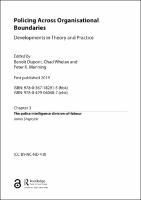Chapter 3 The police intelligence division-of-labour
Proposal review
Abstract
This article describes the police intelligence division-of-labour. It is argued
that police organisation gains overall coherence in relation to the ‘police
métier’; a rationale that allows protagonists in the police world to make
sense of an irrational workplace structure where personal loyalty, trust
and honour (not formal organisational logic) form the basis of action
and compliance. The concept of the police métier is defined in terms of
the police professional concern with the mastery of surveillance and
coercion in the reproduction of order, the making of crime and the
governance of insecurity, and it is the polestar of the police mindset.
The article describes the police intelligence division-of-labour paying
specific attention to four different aspects of intelligence activity: the
acquisition of intelligence or information; the analysis of information in
the production of intelligence; tasking and co-ordination on the basis of
intelligence ‘product’; or being tasked on that same basis. The descriptive
analysis presented here is useful in several respects. Firstly it provides a
basis for the comparative study of police intelligence work and its
configuration within broader processes of security governance.
Secondly, it provides a prototypical organisational map useful
understanding the orientation of particular units – the organisational
elements of policework (e.g. of drug squads, primary response, public
order and homicide investigation units) – within the broader police
division-of-labour. Lastly, it provides a complex view of issues
concerning democratic governance of ‘the police’ as they are configured
as nodes within broader networks of security governance.
Keywords
police intelligence; division of labourISBN
9780429060687OCN
1135845302Publisher
Taylor & FrancisPublisher website
https://taylorandfrancis.com/Publication date and place
2019Imprint
RoutledgeClassification
Politics and government


 Download
Download